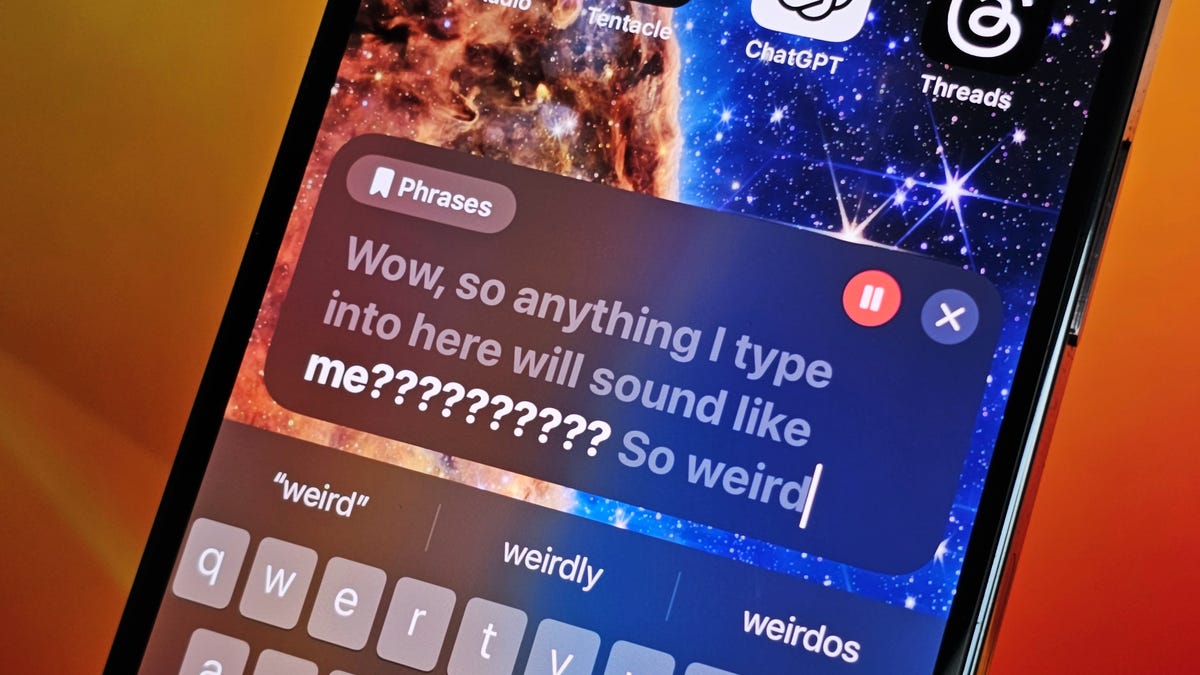Apple iOS 18 Buzz: A Leap in iPhone AI Features
Here are all the hottest rumors surrounding the next major version of Apple's software.

It's rumored AI will play a significant role in iOS 18. In iOS 17, Apple has already added Personal Voice: a new accessibility setting that uses AI to store a replica of your voice on your phone.
Apple's Worldwide Developers Conference is scheduled to take place on June 10, when the the company is expected to release the next version of its iPhone software: iOS 18.
Apple's iOS 18 could bring the "biggest" software update in the iPhone's history, according to a January edition of Mark Gurman's Power On newsletter. In November, Gurman wrote that iOS 18 could bring "relatively groundbreaking" updates to the iPhone complete with "major new features and designs."
Read more: Best iPhone of 2024
The news comes as flagship smartphones play a major role in the generative AI hype cycle. Last fall, Google debuted its flagship Pixel 8 lineup with souped-up AI tricks, and in January, Samsung launched the Galaxy S24 series complete with Galaxy AI. It's likely Apple will go in the same direction with the expected iPhone 16 and iOS 18. CEO Tim Cook has teased such a possibility.
"We've got some things that we are incredibly excited about that we'll be talking about later this year," Cook said an earnings call in response to a question about generative AI.
To be clear, Apple already has AI features on its iPhones like its photo duplication detection feature, but we've yet to see how gen AI will factor into the iPhone and iOS in a major way. With iOS 17, Apple included a slew of AI-powered features like the ability to clone your own voice on the iPhone (which is a form of gen AI) and an updated keyboard with better autocorrect. But the company stopped short of unveiling generative AI products along the lines of Google's Gemini or OpenAI's Chat GPT. Still, the rumor mill points to meaningful changes in iOS 18. Here are the most credible ones.
Read more: Hidden AI Features Available on Your iPhone Right Now
Smarter Siri
Siri had a slight makeover in iOS 17, including two new features that will change how you interact with the voice assistant. iOS 18 could bring even more changes.
Siri has been around since iOS 5 in 2011, but with iOS 18 Apple's voice-activated assistant could get a lot smarter. Generative AI technology "should improve how both Siri and the Messages app can field questions and auto-complete sentences," according to Gurman.
Before his newsletter, a September report from the Information said Apple plans to use large language models, a crucial part of generative AI, to make Siri smarter. An example detailed in that article explained how Siri can respond to simple voice commands for more complex tasks, such as turning a set of photos into a GIF and then sending them to one of your contacts. If that example is accurate, this represents a significant step forward in the capabilities of Siri.
Read more: Apple Just Teased Its AI Plans. You Should Take Notice
Improved texting with Android
Google's launched a website dedicated to advocating for Apple to adopt the RCS text messaging standard, filled with links to tweet notes to the company.
Apple has said it will bring support for RCS, the cross-platform messaging standard, to the iPhone. According to a November report by 9to5Mac, an Apple spokesperson said it'll be coming to the iPhone "later next year" and will work alongside iMessage.
RCS support should improve the current messaging experience between iPhone and Android users by bringing iMessage-like features. Those upgrades include sending high-quality photos and videos to contacts, read receipt, typing indicators and, most importantly, end-to-end encryption, something SMS messaging lacks. In other words, if you have an Android phone and are texting someone with an iPhone, you'll be able to text each other over RCS instead of SMS. However, it's important to remember that iMessage will remain exclusive to the iPhone and other Apple devices. RCS will not bring iMessage to Android phones.
Read more: Google Should Push RCS Texting Further Than Just the iPhone
As mentioned earlier, details are currently sparse on Apple's plans and we don't yet know which iPhones will be compatible with iOS 18. We'll be updating this article as and when we get more details, so make sure to check back. Until then, you can get up to speed with iOS 17.
On-device AI
A recent rumor points to how Apple's generative AI features could operate. According to Gurman, Apple's own LLM is set to anchor the generative AI features on the upcoming iPhone. The primary benefits of on-device AI include better privacy and faster response times, since the data doesn't have to be transmitted to the cloud. But this approach may also make Apple's AI tools less suited to certain scenarios that require a depth of knowledge, like how some chatbots are less useful than others because they don't have access to the open internet. But the iPhone-maker could compensate for these limitations by licensing technology from Google and other AI service providers.
Editors' note: CNET used an AI engine to help create several dozen stories, which are labeled accordingly. The note you're reading is attached to articles that deal substantively with the topic of AI but are created entirely by our expert editors and writers. For more, see our AI policy.

